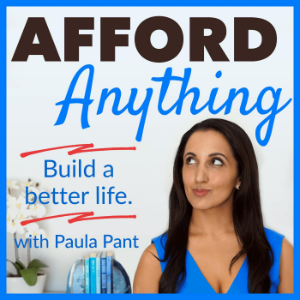
Afford Anything
Cumulus Podcast Network
You can afford anything, but not everything. We make daily decisions about how to spend money, time, energy, focus and attention – and ultimately, our life. How do we make smarter decisions? How do we think from first principles? On the surface, Afford Anything seems like a podcast about money and investing. But under the hood, this is a show about how to think critically, recognize our behavioral blind spots, and make smarter choices. We’re into the psychology of money, and we love metacognition: thinking about how to think. In some episodes, we interview world-class experts: professors, researchers, scientists, authors. In other episodes, we answer your questions, talking through decision-making frameworks and mental models. Want to learn more? Download our free book, Escape, at http://affordanything.com/escape. Hosted by Paula Pant.
Location:
United States
Networks:
Cumulus Podcast Network
Description:
You can afford anything, but not everything. We make daily decisions about how to spend money, time, energy, focus and attention – and ultimately, our life. How do we make smarter decisions? How do we think from first principles? On the surface, Afford Anything seems like a podcast about money and investing. But under the hood, this is a show about how to think critically, recognize our behavioral blind spots, and make smarter choices. We’re into the psychology of money, and we love metacognition: thinking about how to think. In some episodes, we interview world-class experts: professors, researchers, scientists, authors. In other episodes, we answer your questions, talking through decision-making frameworks and mental models. Want to learn more? Download our free book, Escape, at http://affordanything.com/escape. Hosted by Paula Pant.
Twitter:
@AffordAnything
Language:
English
Contact:
707-728-5202
Website:
http://affordanything.com/
What If Everything We Know About Hiring Is Wrong?, with William Vanderbloemen
Duración:01:19:47
Q&A: Rebuilding After Debt Overload and a Near-Miss Foreclosure
Duración:01:20:01
The Brutal Math of Long-Term Dementia Care: How to Protect Your Nest Egg
Duración:01:02:42
James Patterson Shows Why Comfort Can Be a Trap
Duración:01:08:50
First Friday: When the Gov’t is Closed, Where Do We Find the Numbers?
Duración:00:37:21
Q&A: Can You Really Beat the Market by Copying Members of Congress?
Duración:00:59:18
Would You Shock a Stranger? What a 1960s Experiment Reveals About Your Money Decisions
Duración:01:28:17
Q&A: How to Choose Between Financial Freedom and a First Home
Duración:01:14:26
How to Stop Fighting About Money
Duración:01:25:49
Radical Transparency in Real Estate Predictions
Duración:01:02:15
Why High Earners Stay Broke, with Rose Han
Duración:01:12:33
Everyone Says Don’t Hold Bonds in Taxable Accounts. They’re Wrong
Duración:01:24:46
How Money Moves Through Markets
Duración:01:13:26
Q&A: Should You Buy a House Now or Invest Your Down Payment Instead?
Duración:01:08:54
First Friday: The Government Shuts Down -- But Bitcoin is at an All-Time High?!?
Duración:00:41:35
Q&A: Can You Afford a Mini-Retirement?
Duración:01:01:15
The Third Option Between Working and Retiring
Duración:01:12:29
Q&A: My Friend Won’t Invest - How Can I Help?
Duración:01:16:47
The Hidden Psychology Behind Every Financial Decision You Make with Dr. Daniel Crosby
Duración:01:09:41